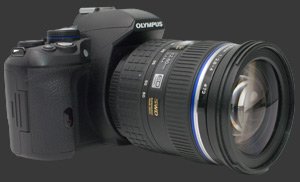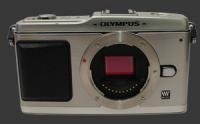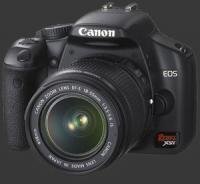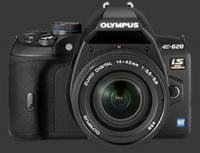Olympus Evolt E-620 Review
Olympus Evolt E-620 Performance - How well does it take pictures?
The image quality of the Olympus E-620 is quite good and has come a long way since the first Four-Thirds cameras. As with all interchangeable lens cameras, several aspects of image quality depend on the lens used. Sharpness is one aspect that depends on both the camera and lens. It seems that the anti-alias filter on the E-620 is pretty strong and so it is expected that the E-620 be more often sensor limited than lens limited. Zuiko lenses are reputed to be of excellent quality relative to their price. Another aspect of a smaller sensor is that it is easier to produce bright lenses.
Olympus has the only F2 zooms as a prime example and their 50-200mm is F2.8-3.5, more than a full stop wider than competing lenses. Even the standard 14-54mm lens is F2.8-3.5, giving an equivalent os 28-108mm. The E-620 came with a 12-60mm F2.8-4 lens which is an excellent range going from ultra-wide 24mm equivalent to a 120mm telephoto reach.

Image noise is certainly the most discussed aspect of image quality. In this regards, the E-620 manages well, although a stop or so behind DSLRs with 1.5X or 1.6X crop sensors. ISO 100 to 400 are completely usable and ISO 800 is where noise becomes apparent without being too intrusive. ISO 1600 is certainly noisy and 3200 noisier but these can still be used for small prints. What is really good about the ISO performance is that softness barely increases with sensitivity.
Metering and dynamic range are really good. The E-620 requires less exposure-compensation that most DSLRs. White-balance is good but not perfect. It does have a bit of trouble under artificial lights, leaving a slight orange cast.
Color accuracy is fairly good too, with some oversaturation in reds and blues.
Performance is generally good with the E-620, although a few aspects are on the slow side. Startup is fast but not instant. At over 2s, power-off time is slow. The camera is almost always quite responsive. Dials and menus respond instantly.
Focusing speed is highly variable. First, the lens makes a huge difference. The excellent 12-60mm F2.8-4 can focus very fast in good light and slows down noticeably when the light is low. The 14-42mm F3.5-5.6 lens on the other hand is rather slow all the time. Manual focusing is done using a fly-by-wire system on some lenses. Luckily, it responds quickly. The downside is that you cannot focus while the camera is powered down.

Continuous drive runs at 4 FPS with a short buffer but it only drops down to 3 FPS after that and manages to keep shooting until the memory card is full. The black-out time is noticeable here, being a little longer than average.
Playback mode is always fast. Zooming and panning are completely responsive, even at low magnification. Going through the various info screens is also quick. Deleting is just a tad slow. One thing that is too bad though is that we cannot delete images from the instant-review screen.

Battery-life is quoted at 500 shots-per-charge. By DSLR standards this is short but certainly not problematic. Live-view eats up more power though, so it is possible to get a lot fewer shots on a single charge.

Olympus Evolt E-620 Conclusion
The Olympus E-620 is one of the smallest DSLR, yet it has a well-rounded feature set and quite a few external controls. The most significant compromise for a DSLR this size is a tiny viewfinder which makes it difficult to confirm focus, and the E-620 is no exception here.
In terms of image quality and performance the E-620 does quite well without being class-leading in any area. Despite the small sensor, image noise is kept low and dynamic-range is excellent. The autofocus performance is slightly below average but the camera always responds quickly.
The bottom line is that the E-620 makes an outstanding choice for those needing a small DSLR, without losing the viewfinder and going to a Micro Four-Thirds digital camera like the EP-1 we just reviewed
Olympus PEN E-P1. The main difference is that, while the EP-1 actually beats the E-620 in terms of image quality, the lack of reflex viewfinder makes tracking moving subjects next to impossible, so for action and sports, the E-620 will be much more useful.
Direct competitors are all a little bigger and include the Pentax K-x and Canon EOS Rebel XSi
Canon EOS Rebel XSi, both excellent cameras with good feature sets. Note that the XSi does not include built-in stabilization.
|
Overall Score: 
|
 |
Please Support Neocamera
All information on Neocamera is provided free of charge yet running this website is a huge endeavor. Purchases made via affiliate links found throughout the site help keep it running and up-to-date. There is no additional cost to you, so please consider buying via these links to our affilates:
If you found any information on this site valuable and did not purchase via our affiliate links, please considering donating via PayPal:
Any amount will be greatly appreaciated. Thank you for your support!
Olympus E-620 Highlights

Sensor-Size: 17 x 13mm

Actual size when viewed at 100 DPI
| 12 Megapixels DSLR | ISO 100-3200 |
| Four-Thirds Mount 2X FLM | Shutter 1/4000-60s |
| 2-Axis Built-in Stabilization, 4-Stop Improvement | Full manual controls, including Manual Focus |
| 95% Coverage Small Viewfinder | Custom white-balance with 2 axis fine-tuning |
| Built-in Dust Reduction | Spot-Metering |
| 4 FPS Drive, Unlimited Images | Hot-Shoe |
| 2.7" LCD 230K Pixels | Lithium-Ion Battery |
| Compact Flash, xD |
Updates
2024.11.18

Best 2024 Photography Gifts for Every Budget
Great gifts for photographers and photo enthusiasts selected for every budget among the best products of 2024.
2024.08.07

Eye Protection Tips for Professional Photographers
The four main considerations for professional photographers regarding eyewear.
2024.07.14

Fujifilm X100VI Review
Flagship fixed-lens compact digital camera with a 40 MP sensor and Image-Stabilization, a first for the series. Retro design featuring dual control-dials, plus direct ISO, Shutter-Speed and EC dials. Its hybrid viewfinder can switch between EVF and OVF mode.
2024.05.09

Fujifilm GFX100 II Review
Flagship 102 Megapixels Medium-Format Mirrorless Digital Camera with 8-Stop 5-Axis IBIS, 8 FPS Drive, 8K Video and 400 MP Super-Resolution capture in a weatherproof and freezeproof body with dual control-dials and dual memory-card slots.
2024.04.03

Fujifilm X-T5 Review
Newest Fujifilm flagship boasting a 40 MP APS-C sensor, 5-axis IBIS with 7-stop efficiency, 15 FPS continuous drive, 6.2K Video capture, dual control-dials and dual SDXC UHS-II slots in a sturdy weatherproof and freezeproof body.
2023.11.20

Best Digital Cameras of 2023
Find out which are the Best Digital Cameras of 2023. All the new Mirrorless Digital Cameras from entry-level to high-end professional.
2023.07.10

Fujifilm X-H2 Review
40 Megapixels APS-C Hybrid Mirrorless Digital Camera with 7-stop IBIS. Fastest shutter ever and 8K video capture. Large builtin EVF with 0.8X magnification and 5.8 MP, plus an Eye-Start Sensor. Packed with features and large number of controls in a weatherproof and freezeproof body.
2023.05.07

Sony FE 20-70mm F/4G Review
Review of the unique Sony FE 20-70mm F/4G lens. The optical zoom of this lens spans ultra-wide-angle and medium focal-length coverage, making it one of the most versatile Full-Frame lenses on the market.
2023.01.15

Huion Inspiroy Dial 2 Review
Review of the Huion Inspiroy Dial 2 tablet, a medium sized drawing surface with dual dials and customizable buttons. Connects via USB-C or Bluetooth 5.0 with Windows, Linux and Android support.
2022.12.08

How to Pack for a Photo Trip
Find out how to pack for a travel photography trip, carry your gear safely while meeting airline regulations.
2022.11.13

Best Digital Cameras of 2022
The best digital cameras of 2022. A short list of the most outstanding models in their respective categories. Choose one for yourself or as a gift.
2022.09.21

Pentax DA* 60-250mm F/4 SDM Review
Review of the Pentax DA* 60-250mm F/4 SDM, the constant-aperture telephoto zoom with the highest zoom-ratio on the market.











